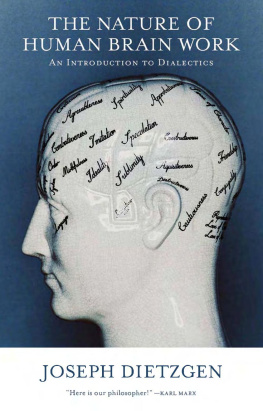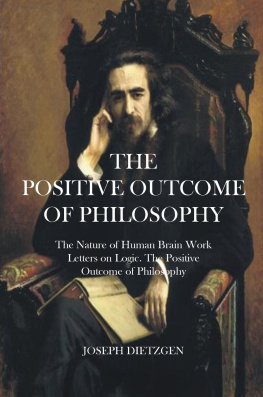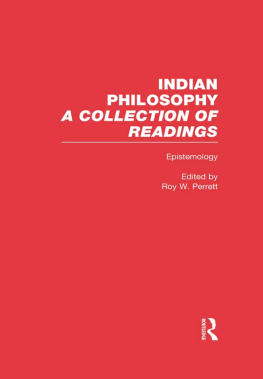Joseph Dietzgen - Excursions of a Socialist into the Domain of Epistemology
Here you can read online Joseph Dietzgen - Excursions of a Socialist into the Domain of Epistemology full text of the book (entire story) in english for free. Download pdf and epub, get meaning, cover and reviews about this ebook. year: 2016, genre: Religion. Description of the work, (preface) as well as reviews are available. Best literature library LitArk.com created for fans of good reading and offers a wide selection of genres:
Romance novel
Science fiction
Adventure
Detective
Science
History
Home and family
Prose
Art
Politics
Computer
Non-fiction
Religion
Business
Children
Humor
Choose a favorite category and find really read worthwhile books. Enjoy immersion in the world of imagination, feel the emotions of the characters or learn something new for yourself, make an fascinating discovery.

- Book:Excursions of a Socialist into the Domain of Epistemology
- Author:
- Genre:
- Year:2016
- Rating:5 / 5
- Favourites:Add to favourites
- Your mark:
- 100
- 1
- 2
- 3
- 4
- 5
Excursions of a Socialist into the Domain of Epistemology: summary, description and annotation
We offer to read an annotation, description, summary or preface (depends on what the author of the book "Excursions of a Socialist into the Domain of Epistemology" wrote himself). If you haven't found the necessary information about the book — write in the comments, we will try to find it.
Excursions of a Socialist into the Domain of Epistemology — read online for free the complete book (whole text) full work
Below is the text of the book, divided by pages. System saving the place of the last page read, allows you to conveniently read the book "Excursions of a Socialist into the Domain of Epistemology" online for free, without having to search again every time where you left off. Put a bookmark, and you can go to the page where you finished reading at any time.
Font size:
Interval:
Bookmark:

First published: by Social-Democratic Library, Hottingen-Zurich 1887;
Published in English in Eugene Dietzgen & Joseph Dietzgen Jr. (eds.), Some of the Philosophical Essays by Joseph Dietzgen, Charles H. Kerr, Chicago 1906, pp. 263-362;
Translated: by Max Beer & Theodor Rothstein.
Transcribed: by Einde OCallaghan.
The subject of the following articles seems to have so little in common with Social-Democracy that their publication as part of the Social-Democratic Library necessitates a few words of explanation.
The theory of cognition with which these Excursions deal has for its subject-matter the question, how is the instrument in our head constituted which everybody has to use in order to gain knowledge of the natural and human conditions which surround him, to distinguish, judge and understand them.
An instrument which everybody possesses and uses may be called a democratic instrument. The intellect is common to all men and, therefore, is a concern of the community or society, a Social-Democratic instrument, a Social-Democratic concern. If Bismarck uses his instrument differently from Social-Democrats we are convinced that he makes a wrong use of his intellect.
Absolute unanimity we can never attain, yet progress in this direction is unmistakable. So also will the theory of cognition never exhaust its subject and render us infallible in the use of our mental powers; still we must not on that account renounce improvement. Social-Democracy, too, is strenuously working with the view of making the minds more unanimous; consequently a well-founded theory of cognition can only be of value to it.
As I say, the theory of cognition deals with the question of how our instrument of thinking is constituted. By learning the nature of it we learn at the same time the use of it. Although the nature and the use of a thing may be regarded as two separate things, it is none the less permissible to coalesce them into one. In my opinion only that person is able to understand the nature of a violin who knows thoroughly how to play it who knows what there is in it and what is to be done to bring it out of it.
That men, with their instrument of thinking, have judged correctly, thought correctly and discriminated exactly without knowing anything of epistemology is, of course, unquestionable. The farmer knows how to grow potatoes without having attended an agricultural college. Yet one cannot but admit that science makes even the farmer more intelligent in his work. It teaches him how to predetermine the results of his work. If he still remains, in spite of his predetermination, at the mercy of wind and weather, yet it cannot be denied that science gives him the means to control Nature to a certain extent. Absolutely free he will never be; science and reflection cannot help him to sovereign power, still they help him. If we cease to be slaves of Nature we shall nevertheless ever remain her servants. Knowledge can only give the possible freedom which is at the same time the only rational one.
And so the instrument which is analysed in the following pages is used by everyone at every opportunity. Nothing is so general and universal in the world of man as perception, discrimination, judgment, knowledge, etc. The theory of cognition must, therefore, be regarded as an elementary study, as the Alphabet, but in a higher sense. A trained intellect goes farther than the art of reading and writing. The celebrated Spinoza already left us an opuscule on the Improvement of Understanding and it is to be regretted that his work has been left incomplete. And it is nothing less than the improvement of this instrument that we aim at in the present Excursions into the domain of the theory of cognition.
Whoever desires to be an intelligent Social-Democrat must improve his method of thinking. It was mainly the study of the improved method of thinking which helped the well-known founders of Social-Democracy, Marx and Engels, in raising Social-Democracy to a scientific standpoint on which it finds itself now. The improvement of the method of thinking is like every other improvement, a limitless problem, the solution of which must always remain unachieved. This, however, must in nowise keep us from striving after it. The only and natural way consists in increasing our general knowledge by mastering the special branches of science. Although the theory of cognition, by setting out to illuminate the lamp from which all light emanates, touches the desired enlightment of the human mind at its very source, we are nevertheless modest enough to acknowledge that such a theory, be it ever so perfect, is not sufficient. Though all special branches of science are conducive to that end, yet none of them is able to form the generalisation which could entirely illuminate the mind. This can only be achieved gradually, wherefore we shall be con tent if these Excursions will have contributed some thing to the general aim of science.
CHICAGO, December 15, 1886
J. DIETZGEN
These words of von Holler are singularly apt to demonstrate on them, how even the eternal truths have succumbed to the corroding influence of time. This so often quoted line of the poet has even now numerous admirers who repeat it. The more reason have we to show those who believe in the old wisdom, what progress is being made by the ever-revolutionary criticism.
The created mind is the special subject-matter of a special science calling itself Philosophy. The meaning of this term has undergone many changes. In the times of the ancient Greeks a philosopher was a general lover of wisdom, whilst nowadays the growth of general culture has proceeded so far as to make people understand that with the general love no great results can be achieved. Whoever seeks wisdom must turn to science, which grows its fruit not in the hazy generality, but in concrete special fields. Philosophy, too, has become a special branch and has a special subject of study which is that of the created mind.
To speak precisely: since Kants time Philosophy has begun to recognise that its former efforts had been more or less of a youthful dream, and that it must, like all other scientific branches, set before itself a definite aim if it is at all to arrive at some sort of result. Philosophy has since then become gradually modernised and has now finally settled down to a critique of cognition.
The created mind or the mental organ which has been implanted by Nature in the head of man, has always puzzled him as a mystery. The solution of this mystery has been effected by the observation that all things, all natural phenomena are mysterious as long as they are not understood, not investigated. The more intimately man gets acquainted with them, the more they lose their mysterious character. The mind is no exception to this rule. Since Philosophy has consciously, clearly and definitely occupied itself with it, the mysterious unknown has become more known and has acquired quite a different complexion.
Just as the fetishists deify the commonest things stones and pieces of wood so has the created mind, too, been deified and wrapt in mystery first by religion and afterwards by Philosophy. What religion used to call belief and supernatural world, was called by Philosophy metaphysics. Still we must acknowledge that the latter had for its laudable object to make of its study a science, an aim which, indeed, it has finally achieved in a physical manner. Behind its own back there has arisen out of the metaphysical world-wisdom the special science of a modest theory of cognition.
Font size:
Interval:
Bookmark:
Similar books «Excursions of a Socialist into the Domain of Epistemology»
Look at similar books to Excursions of a Socialist into the Domain of Epistemology. We have selected literature similar in name and meaning in the hope of providing readers with more options to find new, interesting, not yet read works.
Discussion, reviews of the book Excursions of a Socialist into the Domain of Epistemology and just readers' own opinions. Leave your comments, write what you think about the work, its meaning or the main characters. Specify what exactly you liked and what you didn't like, and why you think so.




